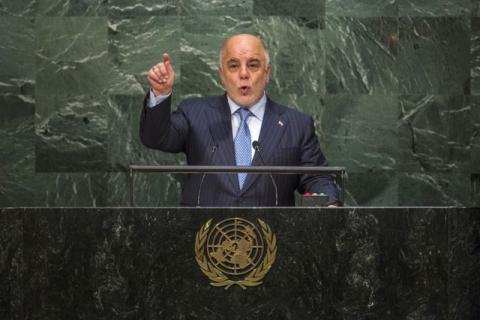Advertisement
Iraqi PM says Turkey not respecting agreement to withdraw troops
BAGHDAD/ANKARA (Reuters) - Iraq's prime minister accused Turkey on Wednesday of failing to respect an agreement to withdraw its troops from the country's north and its foreign minister said if forced, Iraq could resort to military action to defend its sovereignty.
The diplomatic dispute flared after Turkey deployed a force protection unit of around 150 troops earlier this month, citing heightened security risks near Bashiqa military base where its troops were training an Iraqi militia to fight Islamic State insurgents in nearby Mosul.
Iraqi security forces have had only a limited presence in Nineveh province, where the camp is located, since collapsing in June 2014 in the face of a lightning advance by Islamic State.
Iraqi Prime Minister Haider al-Abadi told his Turkish counterpart in a call on Wednesday that a Turkish delegation had promised to withdraw its troops, according to a statement from his media office.
"But the Turkish government has not respected the agreement and we request that the Turkish government announce immediately that it will withdraw from Iraqi territory", he said.
Ankara has acknowledged there was a "miscommunication" with Baghdad over the deployment. It later withdrew some troops to another base inside the nearby autonomous Kurdistan region and said it would continue to pull out of Nineveh province, where Bashiqa is located.
But Turkish President Tayyip Erdogan has said a total withdrawal is out of the question, and Abadi repeated to Turkish Prime Minister Ahmet Davutoglu on Wednesday that Baghdad had not approved the deployment.
Speaking on Wednesday night, Davutoglu said Ankara respected Iraqi sovereignty, but that Baghdad had no control over a third of its own territory. "If Baghdad wants to use force, they should use it against Daesh," Davutoglu added, using an Arabic name for Islamic State.
Abadi said there was no reason for Turkey to expose its trainers to danger by sending them "deep inside Iraqi borders", and that Islamic State posed no danger to Turkey from inside Iraqi territory. Bashiqa is about 90 km (55 miles) from the Turkish border.
Davutoglu also congratulated Abadi after Iraqi forces retook the center of the city of Ramadi this week, a victory that could help vindicate the Iraqi leader's strategy for rebuilding the military after stunning defeats.
MILITARY ACTION
Iraqi Foreign Minister Ibrahim al-Jaafari said earlier in the day that his government was committed to exhausting peaceful diplomatic avenues to avoid a crisis with Turkey, its northern neighbor, but insisted that all options remained open.
"If we are forced to fight and defend our sovereignty and riches, we will be forced to fight," he told reporters in Baghdad.
U.S. Vice President Joe Biden, in a phone call with Davutoglu earlier this month, welcomed the Turkish troops' withdrawal and urged Ankara to continue trying to cooperate with Baghdad.
Biden will visit Turkey on Jan. 23 and will meet Erdogan and Davutoglu, sources from the Turkish prime minister's office said on Wednesday.
After the diplomatic row began, the Bashiqa base came under fire from Islamic State when militants fired rockets in an attack on Kurdish Peshmerga forces in the area. The Turkish military said its soldiers returned fire and four had been lightly wounded in the incident.
(Writing by Stephen Kalin; editing by Mark Heinrich and Dominic Evans)



















Add new comment